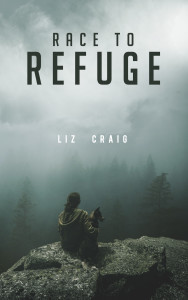Riley Adams's Blog, page 104
May 21, 2016
Twitterific Writing Links
by Elizabeth S. Craig, @elizabethscraig
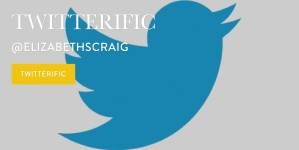
A weekly roundup of the best writing links from around the web.
Twitterific writing links are fed into the Writer’s Knowledge Base search engine (developed by writer and software engineer Mike Fleming) which has over 30,000 free articles on writing related topics. It’s the search engine for writers.
How To Cheat on Your Writing Without Getting Caught: http://ow.ly/3vaw3001hfg @Wordstrumpet
6 Ways to Make Your Writing More Cinematic: http://ow.ly/nzMW3001hly by Oren Ashkenazi @mythcreants
Giving Your Protagonist Tough Choices: http://ow.ly/kDr63001her @ceciliaedits
Distribute More Books In More Territories: http://ow.ly/CiBf300etHh @publishdrive @IndieAuthorALLI
How to Worldbuild a Good Sandbox: 4 Rules from the 40K Universe: http://ow.ly/EGJ03001hfN @mharoldpage
How to Embrace Imperfection as a Writer http://ow.ly/uulF3001hcv @powellwriter
How to End a Chapter: http://ow.ly/w8h43001hhS @jennienash
How to Tell the Difference Between a Scene and a Chapter: http://ow.ly/uxAY3001hj3 @jennienash
Unsung Heroes of the Poetry World: http://ow.ly/6pH3300rdqq @clangswell @thelithub
Tips to Help You Write What You Know: http://ow.ly/SN1Q3001hkL @CSLakin
How to Write Dialogue that Hooks Readers: http://ow.ly/tehp3001h9M @nownovel
4 Writing Secrets Blatantly Stolen From Taylor Swift: http://ow.ly/1mYE3001hmF @Chris_Kokoski
Why We Must Write Introverted Characters: http://ow.ly/2QuC3001hjL @livequiet
How Author Associations Help Your Self-Publishing Career: http://ow.ly/UUhL300etLz @kimbookless @OrnaRoss
Worldbuilding: The Nihilistic Architect and the Negligent Gardener: http://ow.ly/8roq3001hgP @ngfclark @FantasyFaction
Mastering Your Author Persona: http://ow.ly/dWSq3002a7W @Rachel_Aaron
Respect the Power of the Teenage Girl as a Writer: http://ow.ly/Z5cZ300rd3w @robinwasserman @imjasondiamond @thelithub
Writing Believable Action Scenes: http://ow.ly/Qx553000AwC @NakedEditor
5 Books Where Assassins Are the Good Guys: http://ow.ly/o52Z3000Axx @muirwoodwheeler
Reconstruct Your Criticism: Worksheet to Assess Feedback: http://ow.ly/JVwA3000Azg @EvaDeverell
Writing the Fool Triumphant: http://ow.ly/dFWT3000ABW @HeatherJacksonW
Dissecting Books: Reading as a Writer: http://ow.ly/NbAY3000ADR @MarcyKennedy
.@JessicaSaenger: Germany’s @boev backs Constitutional Court complaint (on Copyright): http://ow.ly/nFJW300p2T0 @Porter_Anderson
A Writer Learns to See Through Photography: http://ow.ly/NyS83000Ab4 @swan_tower @tordotcom
Quick tips for writing a book review, even if you’re not a reviewer: http://ow.ly/Q8kG300qE9j @rxena77
Managing a day job while writing 40 books and building a story universe platform with @jonguent: http://ow.ly/IOIA300qDy6 @Hiveword
10 Tips on Navigating Twitter as an Indie Writer: http://ow.ly/QPK83000Amq @FlynnGrayWriter
.@Nielsen Data on the US Book Market: http://ow.ly/zEHl300p2qo @Porter_Anderson @kemptonm @pubperspectives
3 Tips for Writing Character Change: http://ow.ly/s7FO3000Akv @HeatherJacksonW
10 Thriller Story Ideas: http://ow.ly/i9GP3000Aab @RuthanneReid
9 Rookie Errors to Avoid When Plotting Your Novel: http://ow.ly/miaK300oTUF @Roz_Morris @IndieAuthorALLI
Social media: hate or love it? The pros and cons for writers: http://ow.ly/dPZ8300p58c @EmilyBenet @publishingtalk
Stereotypes Surrounding Epilepsy in the Entertainment Industry: http://ow.ly/4nuBZj @LJKelley1
3 Cautions For Adding Research Into Stories http://ow.ly/4nuALK @JodyHedlund
How to Get Readers Hooked: http://ow.ly/NOX83000Ap9 @MorganMandel
Final Fixes for Your Novel: http://ow.ly/Iblv3000AqW @AnthonyEhlers
The Law of Writing Good Bad Guys: http://ow.ly/hvOS3000AiV @LeeLofland
Great literary gardens: from ‘Hamlet’ to ‘Lady Chatterley’s Lover: http://ow.ly/juBI3000xqF @FT by Caroline Thorpe
Writers Steal Your Life and Use it For Fiction: http://ow.ly/WDdp300mvGT @thelithub @aboutrichard
6 Tips to Help You Finish Your Book: http://ow.ly/4nuCbo @KMWeiland
Getting Your Novel to the Finish Line: http://ow.ly/4nuCeX @Janice_Hardy
Tweaks to make our books visible on Google: http://ow.ly/PnLb300oRAk
.@SalmanRushdie on Poetry, Being a Reader, and Going to the Movies: http://ow.ly/oZ54300mmGE @holdengraber @thelithub
15 Tips for Writing Poetry: http://ow.ly/4nuC4H @WordDreams
How to Turn an Idea into a Story: http://ow.ly/4nuClk @DelilahSDawson
Organizing Your Hard Drive: http://ow.ly/4nuBgM @AngelaQuarles
Concept vs. Premise: The Inherent Opportunity in Understanding the Difference: http://ow.ly/4nuCuc @storyfix
12 Ways Not to Write a Mystery Novel: http://ow.ly/v8gR300mv5B by Jacqueline Diamond for @annerallen
Freelancing to pay the Bills: http://ow.ly/G8eI300etwp @jlynchauthor @IndieAuthorALLI
Charles Dickens and the Linguistic Art of the Minor Character: http://ow.ly/4nsadm by Chi Luu @JSTOR_Daily
International Transmedia: StoryDrive in Beijing: http://ow.ly/awRl300jUfV @Porter_Anderson @pubperspectives
Digital Printing and What it Means for Publishing: http://ow.ly/mJGv300mlMK @Porter_Anderson @pubperspectives
Working Without Distractions in Scrivener: http://ow.ly/4nuB9Y @Gwen_Hernandez
Write Better Stories, Faster: http://ow.ly/iZK7300cxkF @sterling_stone @IndieAuthorALLI
Pronoun services for the selfpubbed author: http://ow.ly/4nuBR5 @JohnDoppler
How to Use a Plot Planner: http://ow.ly/4nuChJ @plotwhisperer for @JaneFriedman
Are You A Creator Or A Consumer? http://ow.ly/4nuAQC @InkyBites
Writers, The Loneliest Artists of All: http://ow.ly/4nsaYo @readandbreathe @thelithub
Men Have Book Clubs, Too: http://ow.ly/4nsaGP by Jennifer Miller @nytimesbooks
Crafting a Killer Opening: 4 Writing Contest Finalists Share Their Tips: http://ow.ly/4ns91H @Ava_Jae @MartinaABoone
A storytelling experiment closes 9-1 if @craigmodcan archive the project: http://ow.ly/gbK7300jT6y @Porter_Anderson @pubperspectives
Stephen King: What We Can’t Say Enough: http://ow.ly/4ns9oE @JonathanJanz
Reach Readers While Looking After Yourself (video): http://ow.ly/QvRF300esUB @DanBlank @IndieAuthorALLI
On the Quest to Write in a 3rd Language: http://ow.ly/4ns9FD @LakhousAmara @thelithub
What Comes Before Part 3: A Whole Lotta Character: http://ow.ly/4ns8Vc @mileconnors
Get In Front Of Influencers: How To Spread The Word About Your Book: (video) http://ow.ly/nSQV300esGS @WhereWritersWin
Best Handguns for Fictional Detectives: http://ow.ly/4npgRV @benjaminsobieck
Surviving Hard Knocks U.: A Writer’s Guide: http://ow.ly/4npgDr @RuthHarrisBooks
The upcoming Frankfurt Book Fair: 3 points of interest: http://ow.ly/Jq8I300jRLb @Porter_Anderson @pubperspectives
Putting Words in your Mouth: The Whimsical Language of Food: http://ow.ly/4nsaTz by Chi Luu @JSTOR_Daily
Updating an old book, one author discovers 25 years ago is ancient history: http://ow.ly/4ns8z5 by Johanna Hurwitz
The Shape of Horror to Come: http://ow.ly/4ns97I by Nathan DeCorte @The_Minaret
Use the right word to breathe life into your stories: http://ow.ly/4ns8QZ @RayneHall
Developing Themes In Your Stories: Symbolism: http://ow.ly/4ns9xF @SaraL_Writer
How to Write for Teens Without Sounding Like an Adult Writing for Teens: http://ow.ly/4ns9ti @KurtDinan
10 Ways To Make Your Story Good: http://ow.ly/4ns8Jj @10minnovelist
Use your distributor to market your books: http://bit.ly/IAF-BEA-DW http://ow.ly/zYqf300cxgI @IndieAuthorALLI @danwoodok @Draft2Digital
Writing business: steps to take in case of our demise or disability: http://ow.ly/4npgH1 @Diana_Hurwitz
The Exemplary Narcissism of Snoopy: http://ow.ly/YAwl300hjrK @TheAtlantic by Sarah Boxer
Tips for dealing with writing conference overwhelm: http://ow.ly/4npgkn @CaraLopezLee
5 tips for a better author bio: http://ow.ly/2SpS300cs0L @bryancohenbooks @IndieAuthorALLI
10 Great Novels of Exile and Dislocation: http://ow.ly/4nmDhh @patricia_engel @ElectricLit
Novel? Screenplay? Comic? How to Choose the Right Medium For Your Story: http://ow.ly/4nmD3e @kpsmartypants @thelithub
The Eternal Loneliness of the Writer: http://ow.ly/4nmCRl by Adam Haslett @thelithub
Why A Poet Stopped Submitting To Lit Mags and Publishes to Wattpad: http://ow.ly/4nmsV1 @MariahEWilson
How to Make Boring Story Parts Exciting: http://ow.ly/4nph2i @RidethePen
Using Family Photos, Letters and Stories in a Book: Legal Ramifications: http://ow.ly/4nphqL @HelenSedwick
Adding an emotional stance for characters: http://ow.ly/4nph8K @Kid_Lit
Crime Fiction Writing: On the Job With New York Crime-Scene Cleaners: http://ow.ly/4npgVR @TheAtlantic @sairakh
Tips for writing a blind character: http://ow.ly/4nphkz @snarkbat @ChuckWendig
Writing What You Really Think Will Make You a Better Writer: http://ow.ly/4nphdh by Deena Nataf @WritetoDone
The IPA, the Arab World, and ‘Building Dialogue’: http://ow.ly/zhS5300eBBc @Porter_Anderson @Bodour
The Point When Everything Changes: http://ow.ly/4nmuN4 @stdennard
Why You Should Theme Your World: http://ow.ly/4nmtgD by Chris Winkle @mythcreants
Why is text-to-speech only an afterthought? http://ow.ly/LbWm300csw6 @jwikert
Tech Tools and Promo Tips for Writers: http://ow.ly/Ci3e300eBqy
Simple Tricks to Unstick Your Plot: Where Is Everyone? http://ow.ly/4nmv05 @stdennard
This year’s BEA: light attendance, ‘hard truths’ on publishing: http://ow.ly/9kAQ300eB3G @Porter_Anderson @jakonrath
6 Crucial Steps before you launch your #indieauthor book: http://ow.ly/w8ne300crWz @IndieAuthorALLI @bublishme
Blurb writing formula: http://ow.ly/4njAaM @VictoriaMixon
6 Ways to Ruin Your Book Marketing Campaign: http://ow.ly/4njA5z @selfpubreview
The Myth of the Average Reader: http://ow.ly/4njCc4 @cathyyardley
Emotion Takes Time: http://ow.ly/w3ZA300eAWm @p2p_editor
Teaching Writing with Mentor Texts: Reading Like a Writer: http://ow.ly/4nmtre @BethMooreSchool
The Art of Captivating First Lines: http://ow.ly/4nmtVc @AJHumpage
How To Lead Readers to a Satisfying Ending: http://ow.ly/4nmtB2 by Margo Dill
Writing Better Villains: http://ow.ly/4nmtKZ by Vincent Langford @mythicscribes
4 Publisher Responses and Author Reactions: http://ow.ly/4nmtZf by Sarah Tipton @YAtopia_blog
Writing a Novel Within a Novel: http://ow.ly/4nmt4u @YonaMcDonough
Grow Your Author Business with a Learning Plan (video): http://ow.ly/ySbr300aqbB @MichaelLaRonn
Download the Ultimate Free Collection of Book Marketing Examples: http://ow.ly/4njCuy @DianaUrban
Writers staying in touch with their readers: http://ow.ly/4njAjL @stephenwoodfin
Africa Has Always Been Sci-Fi: http://ow.ly/4njCf7 @snamwali
How to Use Surprise to Build Suspense: http://ow.ly/4njAhX @janekcleland
Disability in Kid Lit: Scoliosis in Books: What’s Missing? http://ow.ly/4njAcK by Emma Yeo
Crime Fiction Writers: Buried Alive: Escaping a Grave: http://ow.ly/vsVl300cwYh @SueColetta1
Copywriting is creative writing: http://ow.ly/GhT3300crPO @bryancohenbooks @IndieAuthorALLI
Ghost-writers and their soul projects: http://ow.ly/hgpZ300d63h @Roz_Morris
Going From Being a Fan Fic Writer to a Published Author Before Turning 18: http://ow.ly/LJLs3009V7A @singsongash
Tips for Torturing Characters: http://ow.ly/4njAmd by James R. Preston
What it means being an African author on Amazon: http://ow.ly/cxWb300csoi @DaWitKop
The top writing links of last week are on Twitterific:
Click To Tweet
The post Twitterific Writing Links appeared first on Elizabeth Spann Craig.
May 19, 2016
Making Our Books Visible on Google

by Elizabeth S. Craig, @elizabethscraig
Today I give you what is likely an incredibly boring post on something I know very little about. But, because I think it’s important, I’m trying to learn more about it and also share my kernel of knowledge on the subject with you. With that disclaimer, let’s move on. :)
Much is said by industry observers about the problem of visibility for writers. After all, the number of books is growing and it’s harder for readers to find us.
One way that we might be able to give our books a push is in searches. This can mean making our SEO better on Amazon by tweaking keywords and BISAC. This may also mean tweaking our sites and individual book pages so that Google can make our book stand out in a search.
This means, in a nutshell, structured data markup. This means inserting code/metadata on our site that helps Google understand and organize information to deliver rich results for searches.
Or, if that all sounded like gobbledy-gook (which it sort of did to me and I wrote the sentence), then basically, to deliver something that looks like this when searching for my title Pretty is as Pretty Dies:
So a reader, when searching for this book title, gets this closeup of my book in their sidebar. It shows them the cover, my name, gives them the opportunity to preview it, gives a description, publication year, and even links to reviews. Basically, it gives them a really nice (rich) search result.
To find out more information on this, read on Google:
A gallery of structured data that produces rich results (of different types…from recipes to products, reviews, and even events).
If you click on one of the types of results on the gallery page, Google shows you the metadata you’ll fill in.
Google’s introduction to structured data.
Let’s go back now to what I did, specifically, to make that result show up. Because this was a traditionally published book and the first in a series that I now self-publish, I started with this book. I included reviews from Foreword and Kirkus, but it looks to me you could do this with any type of review.
I used a schema creator site to make it easier on me. The site creates a review schema for you. You can also do this for any product/book: http://schema-creator.org/product.php or http://www.microdatagenerator.com/pro... .
After you’ve received code back, you can test it with Google to make sure it looks accurate .
You paste in the code you were given and it shows you what it will look like:
Then you need to put it on the page. Sometimes I can stick code on a page and it doesn’t show up. This did show up, so I had to find a way to put it on the page without it seeming out of place (could one put this in their header or footer? I didn’t experiment for that long). I pulled up the individual book page, put the page in text composing mode instead of visual composition mode, and pasted the code in. You can see the result of that here.
I gave Google a little time and it came back with a terrific search result (clearly on Google, not Yahoo search or other engines. But Google is, currently, the big dog).
When I haven’t set up a book page that way, a search for one of my titles comes back like an ordinary search result.
I think, eventually, if our books get enough sales and traffic, Google indexes us anyway. Like this book of mine:
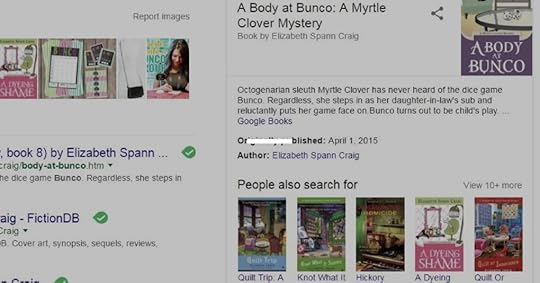
But you’ll notice that, unlike the example above, it doesn’t have a preview or reviews. That’s because I haven’t had the time to set up the schema for the book.
Or this result. This is a regular search result for my more-recent release, Murder on Opening Night. No rich result. In fact, it even suggests someone else’s book:

This is all I can say and, sadly, all I really know on this topic. My next steps are to read up more when I can and add this code to all of my book pages for optimal results on Google.
Do you use a schema on your website? Do you, hopefully, know a lot more about this topic and can share with us? :)
Tweaks to make our books visible on Google:
Click To Tweet
The post Making Our Books Visible on Google appeared first on Elizabeth Spann Craig.
May 15, 2016
Tech Tools and Promo Tips
by Elizabeth S. Craig, @elizabethscraig
Here are a few updates on what I’ve found helpful or interesting lately in the promo and writing worlds.
For the writer who has multiple releases a year, a Coming Soon page on your website. This was suggested to me by a reader who was having a hard time keeping up. The important thing with this page is to keep it updated since it’s not one of the pages we’re on very often.
A nice link to add to the Coming Soon page (along with other pages on our site) is a link to our Amazon Author Central page with instructions to follow us there. I just put a simple: ” Follow me on Amazon for release updates” up.
I struggle with design issues and use design too often to just continually outsource it to a real designer. I’m getting by now with Canva for Twitter and blog headers/backgrounds, but I’ve recently discovered Designfeed.io. Although I’ve gotten very handy with Canva, so far I’ve found Designfeed a bit quicker, at least in terms of throwing images up on the blog. It has a feature where it matches your headline text to Creative Commons images, which is a timesaver. Again, my design skills are limited and I’m sure you could do better, but today’s and yesterday’s posts demonstrate my dabbling with it (for only about 5 minutes). It’s free and in beta. Might be worth playing around with (not sure if there will be a pay version once it moves from beta).
Pirating my content, I’ll be honest, hasn’t even been much of a concern of mine. Many pirate sites are dummy set-ups to get the unsuspecting reader’s info without delivering the goods. Plus, I just don’t think the majority of my readers are out there trying to beat the system. However, I know many, many writers are concerned about pirating. There is an interesting way to dispense with unauthorized use of your content with a free tool called Blasty. Like Designfeed.io, it’s also in beta and currently free. I heard about it from a mention in Jane Friedman’s excellent Electric Speed newsletter full of digital media tools and resources (view her archives here for a wealth of info and to see whether her newsletter might be right for you). With Blasty, you register with the site, they verify you are the owner of the content, and then they alert you to illegal copies. With one click, you can eliminate them (although monitoring this could be a real time suck.)
Indie writers with audiobooks through ACX will be familiar with the complimentary Audible download codes that they provide in their effort to get more readers to give audiobooks a go. It took me a while to get to the point where I actually knew the best way to use these. I’ve found that my last newsletter campaign to readers has worked really well so far. It, luckily, corresponded with a new release so the newsletter had details about the book launch, a couple of recipes (standard fare for my list), a plea to follow me on Instagram (more on that below), and an invitation to enter a giveaway for one of the 25 free downloads. I set up a special page on my website, linked to the address in my newsletter, put up the audiobook’s back cover copy and cover, and then embedded a Rafflecopter giveaway (I use the free version). So far I’m at 60ish entries. You can ask your readers to share a link to a giveaway or follow you on social media for extra points, etc. Anyway, a nice way to use those codes.
As I mentioned above, I started an Instagram because I felt I needed a really dedicated place online where I specifically hung out with readers. My platform is very writer-centric since that’s my comfort zone. When I set up the Instagram account, it automatically connected to my personal Facebook account (which made me really peeved since this was not supposed to be a personal Instagram account). Since my followers there were getting really lopsided with non-readers, I asked my newsletter readers to follow my new account on Instagram…”since my teenage children feel sorry for me.” Which is absolutely the truth…my 19 year old was liking pictures out of pity and finally called me on the phone from college to ask me what I was trying to do on Instagram. Luckily, my plea worked and my reader numbers have greatly improved. I think, hopefully, this will become a more organic process from here with Instagram’s algorithms suggesting my page to others.
I had my newsletter in draft form on MailChimp for several days so that I could be more thoughtful about what material I included in it. I rarely send newsletters and wanted to ensure that I used this device wisely when I did.
And that’s all I’ve got for now! What have you been working with or found helpful lately?
Tech Tools and Promo Tips for Writers:
Click To Tweet
The post Tech Tools and Promo Tips appeared first on Elizabeth Spann Craig.
May 14, 2016
Twitterific Writing Links
by Elizabeth S. Craig, @elizabethscraig

Twitterific writing links are fed into the Writer’s Knowledge Base search engine (developed by writer and software engineer Mike Fleming) which has over 30,000 free articles on writing related topics. It’s the search engine for writers.
Survey: Translated Fiction Outsells English Fiction in the UK: http://ow.ly/6Oi83009TIq @DennisAbrams2 @pubperspectives
How Crutch Words Are Holding Back Your Writing: http://ow.ly/4ni9oi by Ian Chandler @write_practice
Classic adventure plot notes: http://ow.ly/4nia3x @robinrwrites
Writing for Kindle Worlds: the Good and the Ugly: http://ow.ly/ThMW300crl1 @IndieAuthorALLI @tobywneal
5 Elements for Crafting a Compelling Story: http://ow.ly/4nia0n @WillBluntAU
Why Your Business Biography is Killing Sales: http://ow.ly/4ni8Yw @MilesAllen1
Learning from Literary Short Fiction: http://ow.ly/4ni9ji @artofstoriesAB
“Buddy Love” Plot Notes: http://ow.ly/4niaaH @HeatherJacksonW
Book Signings: Best Tips: http://ow.ly/4ni8Wn @MilesAllen1
IDPF’s Con at BEA: ‘Is IDPF on the Way Out?’: http://ow.ly/Q7Bt3009U28 @Porter_Anderson
Are you making these mistakes with your Amazon book description? http://ow.ly/4ni92X @sandrabeckwith
6 Hard Truths Every Writer Should Accept : http://ow.ly/4nia1l @DanaElmendorf
Storyteller’s Rulebook: Give Them a Big Hole to Fill: http://ow.ly/4ni9Yu @CockeyedCaravan
4 Classic Conflict Types: http://ow.ly/4njA3l @Janice_Hardy
The Fine Art of Story Resonance: http://ow.ly/4njCjb @stdennard
Germany’s Inkitt: Using Algorithms to Predict Successful Books: http://ow.ly/QtXt3009UcB @DennisAbrams2 @pubperspectives
Battling Tired Tropes: Hate-at-First-Sight Love Stories: http://ow.ly/4njCr2 @stdennard
Maintaining Passion for a Story: http://ow.ly/4njCoB @stdennard
Know Your Enemy: Procrastination: http://ow.ly/4ni9gQ @artofstoriesAB
“The Hatred of Poetry”: Does Poetry Make Us Human? http://ow.ly/4ni9Il by Ben Lerner @PoetryFound
What Most Antagonists Lack: http://ow.ly/4nhieF by David Ben-Ami
9 Ways to Include Libraries in Your Book Marketing Plan: http://ow.ly/4nhjgP @tspoetry @charityscraig
African Short Stories: Shortlist for 17th Caine Prize Announced: http://ow.ly/dDbx3009TNv @DennisAbrams2 @pubperspectives
Writers Need An Escape Hatch: http://ow.ly/4nhhFP @jayewells
10 Dirty Secrets of Publishing: http://ow.ly/zWY6300crAu @cjlyonswriter @IndieAuthorALLI
More on Wattpad Studios: http://ow.ly/NHXy3009Top @Porter_Anderson @AronIsHere
5 Tips for Writing Book Two: http://ow.ly/4nhhWp @AmyBearce @DIYMFA
Count Words but Make Words Count: http://ow.ly/qmxB3009WYO @Lindasclare
Europe’s ebooks ‘stalling even earlier’ than in the US and UK: http://ow.ly/bU3S3009T6s @Porter_Anderson @wischenbart
Do You Harness Your Day? http://ow.ly/4nhjdf @AngelaQuarles
How Can I Get Help Writing a Book? 7 Tips: http://ow.ly/4nhjqY @nownovel
How a Creative Approach to Book Signings Sells Books: @JanetShawgo @MillCityPress
To Agent or Not To Agent? http://ow.ly/4nhjvg @MistyMassey
What Are Your Characters Not Saying? http://ow.ly/4nhhTQ @Janice_Hardy
5 Strategies for Prolific Reading: http://ow.ly/4nhjCp @gyoung9751
Adding a Theme to Our Book: http://ow.ly/4nhhQz @JillWilliamson
How to Become a Full-Time Writer: http://ow.ly/4nhiYt @joebunting
Improve Your Writing Skills with 5 Storytelling Exercises: http://ow.ly/4nhhLf @MarianSchembari
Writing Dreams and Nightmares: http://ow.ly/4nhhE7 @Ava_Jae
Romance Novels: Why You Need to Go Beyond the Tropes: http://ow.ly/4nesEE @willvanstonejr
In Defense of Grown Men Crying: Writing as Exploration: http://ow.ly/P5h23009bd4 @LeeMartinAuthor @thelithub
The fine art of literary hate mail: http://ow.ly/zr2m30087so @NewRepublic by William Giraldi
Which Publications Pay Freelance Writers (and How Long it Takes to Get Paid): http://ow.ly/YA0p3009dQ1 @manjulamartin
Noir Is Protest Literature: That’s Why It’s Having a Renaissance: http://ow.ly/4neAcT @nicholas_seeley
5 tips for street teams: http://ow.ly/C7be300832X @Danika_Stone
Sidekick Archetypes: http://ow.ly/4nezT2 @kylieday0
What is the theme of all great novels? http://ow.ly/4neAuy @CalebPirtle
The art of the story hinges on orphans: http://ow.ly/78wh30087bw @mikesmariani @Hazlitt
5 Fight-Writing Tactics: http://ow.ly/4nesjZ @blairmacg
Things Daredevil Teaches About Writing: http://ow.ly/4nesXY from She Who Writes Monsters
Shaken but Not Stirred. The Racy Side of Sexpionage: http://ow.ly/4nezFo @BishsBeat
Publishing Exhaustion: http://ow.ly/4nezKT @CEMcKenzie1
Infiltrating Literature’s Secret Societies: http://ow.ly/4neApD @TobiasCarroll @thelithub
Mapping Character: http://ow.ly/4nezOM @AlmitraClay
How to create a memorable character: http://ow.ly/4net2N @Peter_Rey_
Why Are There So Many Novels About Famous Writers? http://ow.ly/4neAk5 @hellermcalpin @thelithub
Foreword Vs. Preface Vs. Introduction: http://ow.ly/4ndKhi @jckunzjr
5 Ways Authors can be Tweeps, not Twits: http://ow.ly/4ndKfx @heatherdgilbert
What to Post on Social Media Plus 38 Examples: http://ow.ly/4ndKcW @CaballoFrances
The Joys (and Perils) of Literary Tourism: http://ow.ly/4ndD7Z @laura_jbarnett @thelithub
5 tips to keep bullying at bay in your blog comments: http://ow.ly/4nbLXt @cksyme
Using Crime Fiction to Present Fully Formed Muslim Characters: http://ow.ly/ehdS3002k6G @AusmaZehanat @GraffMarni @thelithub
10 Pages You Should Include in Your Author Website: http://ow.ly/4nesdy @shelleyhitz
6 Ways to Set Up Scrivener for Writing: http://ow.ly/4nessg @ckmacleodwriter
The Cycle of Action-Reaction in Novel Scenes: http://ow.ly/4nesma @CSLakin
Amazon Themes and Keywords: Optimizing Your Book Page: http://ow.ly/4nerWf @Bookgal
Use KindleSpy for Genre Competitive Analysis: http://ow.ly/4nbKGt @worderella
When you don’t agree with your editor: http://ow.ly/4nbJLx @DeborahJay2
Anton Chekhov: A Post-Modernist Ahead of His Time: http://ow.ly/3wpr3002jvT @thelithub by Peter Constantine
3 Groups of Words or Phrases to Edit in Your Novel: http://ow.ly/CaO430057bk @lornafaith
Why Fiction Needs More Women Scientists: http://ow.ly/rM6930055NF @EileenPollack @thelithub
How Mapping Alice Munro’s Stories Helped One Writer: http://ow.ly/4nbLbH by Elizabeth Poliner @thelithub
“The population of Japan is…a third of the US, but the book market is comparable:” http://ow.ly/PXCO3002fPl Alvin Lu and @Porter_Anderson
Why we love reading to cry: http://ow.ly/4nbLpD by Lindsay Lynch @thelithub
What Level of Editing Do You Need? http://ow.ly/4nbJB4 by Jessica West @K8Tilton
How to Give Your Facebook Page Likes a Quick Spike: http://ow.ly/4nbIgv @cksyme
Mastering Metadata: the Key to Marketing Your Books: http://ow.ly/4nbKKE @carlaking
Building Your Author Mailing List: http://ow.ly/4nbIjv @pbackwriter
To Swear Or Not To Swear in Our Books: http://ow.ly/4nbKDl @RobinStorey1
Turning a feature film script into a novel: http://ow.ly/4nbKQa @Meinertzhagen @ElectricLit
Handling The Pressure Of Being An Indie Author: http://ow.ly/4nbKuc @ShadowChaosFox
Should you convert your Facebook profile to a page? http://ow.ly/4nbJnU @cksyme
Crafting Serial Fiction: http://ow.ly/4nbJsV @mlgardnerbooks
5 Top Snapchat Tips for Marketers: http://ow.ly/4n6ofe @Ashread_
The links I shared last week: http://ow.ly/bVvR3002gxg All the links (30K+ free and searchable) I’ve ever shared: writerskb.com
Why rural lives and literature are in crisis: http://ow.ly/uxaE3002jKn @thelithub by Matthew Neill Null
Why Are Subscription Services Outside the US Succeeding? http://ow.ly/5oN33002fJQ @pubperspectives @Porter_Anderson
Two Body Language Ninja Moves: http://ow.ly/L3OI3003Hod @p2p_editor
5 Comparisons Not To Make For Your Book: http://ow.ly/4n6nId @ChuckSambuchino
How to Price Self-published Books: 5 Questions to Ask Yourself: http://ow.ly/4n6msE @DebbieYoungBN
Garage sales in crime fiction: http://ow.ly/SSOr3002cVT @mkinberg
Is literature a dying animal? http://ow.ly/AHNf3002jVT @GuardianBooks by Edna O’Brien
Pros and Cons of Changing Genres: http://ow.ly/iQFu3002gtJ
What NOT to Say to a Publisher: http://ow.ly/uxJE3002g8m @DancingLemurPre @SpunkOnAStick
A Global Update on ‘the State of Copyright’: http://ow.ly/5rkl3002fhU @MJHealy @Porter_Anderson
What 1 author learned at the London Book Fair: http://ow.ly/4n6n9b @SukhiJutla
Advice on handling criticism: http://ow.ly/aT2S3002cNa @pubcoach
How to be a Good Critique Partner: http://ow.ly/5voU3002c0f @LyndaRYoung @TheIWSG
Writing Motivation Comes From a Sense of Control: http://ow.ly/4n6nPj @Wordstrumpet
Why authors need a mailing list: http://ow.ly/4n6njh @SukhiJutla
Getting to The End: How to Finish a book: http://ow.ly/4n6o3q @KAMcCleary
How an Agent helps 1 Writer Succeed as a Hybrid Author: http://ow.ly/4n6n2d @srjohannes
The Writer’s Guide to Building an Email List: http://ow.ly/4n6nG7 @KimberleyGrabas
A Simple System for Great Character Creation: http://ow.ly/4n6nVz @Rachel_Aaron
Want to Write a Novel? How to Get Started: http://ow.ly/4n6o8c @aliventures
Set Up Your WordPress Blog in Under 15 Minutes: http://ow.ly/4n6nCS @KimberleyGrabas
Top 4 Editing Tricks for Creating a Seamless Narrative: http://ow.ly/4n6nqV @KMWeiland
Creating Tension: Change It Up: http://ow.ly/4n3zoc @ShanDitty
8 Things That Will Derail Your Writing Goals the Fastest: http://ow.ly/4n3ApX @EdieMelson
Motherhood vs. Art: There Is No Wrong Choice: http://ow.ly/bXfS3000xBO @ndianaolde @thelithub
Last week's top writing links are on Twitterific:
Click To Tweet
The post Twitterific Writing Links appeared first on Elizabeth Spann Craig.
May 11, 2016
Promotions on the Ground
by Danika Stone, @Danika_Stone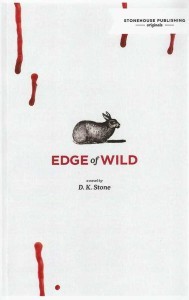
If you’re an author, you’ve no doubt heard the term “Street Team”. It’s one of those phrases that gains popularity in an instant and is thrown around with the wink-wink, nudge-nudge sense that you should know what it means.
But what if you don’t?
What if this is your first book launch, and you’ve never had to publicize a book before? What if you’re struggling to find your way through the first round of edits – never mind promotions! If that’s you, then here’s your answer: a five-point summary of street teams, and how having one can help YOU sell your book faster and more effectively than you ever thought you could.
They are the author’s “feet on the street” – or in this case – the internet.
A street team is composed of online bloggers / reviewers / social media people who assist in the online launch of a book during the first crucial weeks. Every author needs a voice online if they want their books to be found and your street team creates it.
The usual expectation is that the relationship has benefits for everyone involved. Authors generally include swag, publicity, and connections to their street team members, and in return, these bloggers keep the author’s book in the public eye.
Build your Network:
Having connections to bloggers and reviewers is key, but even if you have a relatively small number of online followers, you can still find a street team. You just need to ask. Find bloggers and ask them. Post to Goodreads and Facebook. Show what you’re offering. When I was creating the street team for Edge of Wild, I posted in all these places. I also listed what the street team members would get in return for their participation and within a few days I had an enthusiastic street team ready to spread the word!
Giveaways give back.
Since my promotions budget was relatively small, I capped my street team at ten people. The costs are not just for the giveaways and your books. It’s also time. You will be writing plenty of posts, as well as organizing.
Some things you might include in your giveaway are…
A signed first edition copy of your book.
A digital ARC.
Bookmarks, postcards and stationary.
Bookbags, clothing items, other swag.
Pens, paperweights, keychains.
Basically whatever fit YOUR book..
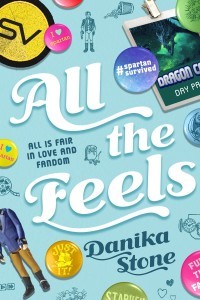
Keep your costs reasonable.
If you’re self-publishing, your biggest asset is the book itself. Print a few galleys before the release! Beyond that, most of the items can be made or purchased.
Do not pay for a thousand pens with your book’s name on it. (You’ll regret it.) Go small and special. In my case, I designed and produced my own bookbags and tee-shirts. I also bought a few items from Michael’s, laminated bookmarks at Staples and printed postcards from Moo.
For the love of all that’s good, STAY ORGANIZED.
Nothing will destroy your street team faster than lack of planning. And since the author is in charge, you need to stay organized whether that’s your natural approach to writing or not.
When Edge of Wild’s street team had a full roster, I put together a Google folder to keep everyone’s tasks straight, and then mailed out a “Welcome to the Street Team” email. I encouraged the group to develop their own projects for their blogs. Some wanted guest posts, others reviews, and a few opted for other items. All of these were laid out in the google docs. Organized. Clear. They were all ready to go long before they were needed.
In the end, a street team’s effectiveness is as much about how you make the bloggers feel as much as what you do. A little bit of planning and patience goes a long way. Your street team is your voice, so make it strong.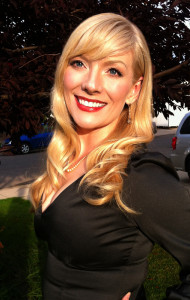
Danika Stone is an author, artist, and educator who discovered a passion for writing fiction while in the throes of her Masters thesis. A self-declared bibliophile, Danika now writes novels for both adults (Edge of Wild, The Intaglio Series and Ctrl Z) and teens (All the Feels). When not writing, Danika can be found hiking in the Rockies, planning grand adventures, and spending far too much time online. She lives with her husband, three sons, and a houseful of imaginary characters in a windy corner of Alberta, Canada.
Ms. Stone is represented by Morty Mint of Mint Literary Agency.
Websites: http://www.danikastone.com/ and http://www.authordkstone.com/
Twitter: https://twitter.com/Danika_Stone
Blog: http://danikastone.tumblr.com/
Book Release #1: Edge of Wild, Stonehouse, May 1, 2016:
Book Release #2: All the Feels, Macmillan, June 7, 2016
5 Tips for Street Teams by @Danika_Stone:
Click To Tweet
The post Promotions on the Ground appeared first on Elizabeth Spann Craig.
May 8, 2016
Pros and Cons of Changing Genres
by Elizabeth S. Craig, @elizabethscraig
About a year ago, I wrote and released a book in a completely different genre than I’ve ever written before. The dystopian novel was something I called ‘cozy zombie’–zombie lit without the gore. The book was what’s known as an ‘attack novel.’ The concept had bugged me for years and I finally broke down and wrote the book.
A year later, I’ve found that the experience of changing genres had its pros and cons.
Pros
Not only was it fun writing something completely different, it was challenging, too. I felt that I grew a lot, as a writer, while working on the book.
I’ve been able to connect with a completely different type of reader by publishing a zombie book. Not only that, but I’ve had different opportunities pop up. BookTrack, the company that matches soundtracks with books (the soundtracks adjust to the reader’s pace) offered to produce the booktrack and put my book up on their platform. Apparently, they need more of this type of content (no offers to produce my cozy mysteries, ha! I guess they know their audience).
Cons
I felt that I couldn’t possibly write the book under my real name because I’m so tied to my branding as a mystery writer. I didn’t want to confuse my readers and field a lot of emails in the process. I decided on a compromise–I used Liz Craig, since my name has a million nicknames. Amazon Author Central happily still connected the name to my profile and even sent out new release emails to my readers when the book came out. So why is this a con? I didn’t still feel I could really promote under a different name—I just didn’t have the time. Liz Craig has no online presence that’s not tied to my own website. Would Liz have done better on her own? Maybe. But her alter ego is just a little pressed.
When Booktrack contacted me about promoting the upcoming Booktrack release, they knew I had a pretty big online footprint. But I had to explain to them that it wasn’t for zombie fiction. My newsletter list, my followers on social media…they were all mystery readers. It’s like starting over.
Something else to consider, although it wasn’t a problem for me–does your freelance design, editing, and formatting team handle your new genre? For design, this might particularly prove a challenge.
Would I write another genre again? For sure. I’ve no doubt that I’m going to branch out again in either a mystery subgenre or a different genre. That book of mine had to be written because the story wouldn’t let me go. But, with any luck, the next time I do something like this I’ll have more time to interact as the pen name.
Have you considered writing other genres?
The post Pros and Cons of Changing Genres appeared first on Elizabeth Spann Craig.
May 7, 2016
Twitterific Writing Links
by Elizabeth S. Craig, @elizabethscraig
Twitterific writing links are fed into the Writer’s Knowledge Base search engine (developed by writer and software engineer Mike Fleming) which has over 30,000 free articles on writing related topics. It’s the search engine for writers.
(developed by writer and software engineer Mike Fleming) which has over 30,000 free articles on writing related topics. It’s the search engine for writers.
And Happy Mother’s Day to the mothers out there!
How Far Back in Time Could You Go and Still Understand English? http://ow.ly/4n1WTw @scholarlykitchn
How Disaster Movies Creep Into 1 Writer’s Writing: http://ow.ly/4n1X24 @WomenWriters @SamTongeWriter
How to be a Better and Happier Writer: http://ow.ly/4n1X6N @MahinWriter
3 reasons why you should show your work: http://ow.ly/4n1X8Y @austinkleon
On worrying about the scarcity of new ideas: comic from @inkyelbows: http://ow.ly/4n1XeZ
The Literary Spy Novel: 5 Recommendations: http://ow.ly/4n1XmY @paulvidich @ElectricLit
13 Ways Writers are Mistaken for Serial Killers: http://ow.ly/4n1XzP @KristenLambTX
How Indie Authors Can Grow their Following on Twitter: http://ow.ly/4n1XxB by @jessicadavis @theindiepubmag
How to Promote Your Book Without Being Annoying: http://ow.ly/4n1Xq0 @egabbert
Friends as Enemies: http://ow.ly/4n1Yr5 @beccapuglisi
Choosing Your Words Carefully: http://ow.ly/4n1YpR by Ursula Bloom @WomenWriters
First Draft Writing: 7 Tips for Easier Drafting: http://ow.ly/4n1XlL @nownovel
Everything You Need to Know About 3rd-Person POV: http://ow.ly/4n1YrP @KMWeiland
Done is Better Than Perfect When It Comes to First Drafts: http://ow.ly/4n1Yar @hwrightwriter
Group Blogging: Humanize Your Blog to Drive Engagement: http://ow.ly/4n1Xto @kikolani
An agent on novels with shorter than usual word count: http://ow.ly/4n1Yg7 @Janet_Reid
A common problem with dialogue: http://ow.ly/4n1Yul @storyfix
US-Based Copyright Clearance Center Buys UK’s Ixxus: http://ow.ly/4nuD3r @Porter_Anderson @steveodart
Writing Building Blocks: Paragraph Breaks & Voice: http://ow.ly/4n1YkG @JamiGold
. @ThatKevinSmith on Screenwriting: http://ow.ly/4n3zTA and http://ow.ly/4n3zWj @steveryfle
4 Types of Character Flaws: http://ow.ly/4n3zyy @AngelaAckerman
Lessons From @jamesscottbell : Characters That Jump Off The Page: http://ow.ly/4n3zAi @AngelaAckerman
Poets: Use Your Skills to Nab Freelance Writing Jobs: http://ow.ly/4n3zvR @Carolynesutra
Subsidiary Rights: http://ow.ly/4n3zrY @SusanSpann
6 Books on Writing Science Fiction Compared: http://ow.ly/4n1WQy by Chris Winkle @mythcreants
Harvard Book Store Partners with Canada’s Shelfie: http://ow.ly/4nuCRH @Porter_Anderson @getshelfie
The Anatomy of a Print-Only Deal: http://ow.ly/4nuyg5 @KatyRegnery
Success: –what exactly is it? http://ow.ly/4n1exn @dianapfrancis
Using Close-Ups in Your Scenes to Get Personal: http://ow.ly/4n1ess @CSLakin
Writing fight scenes: knocking someone out without serious injury: http://ow.ly/4n1eyl from How to Fight Write
Writing Time And Place: http://ow.ly/4n1etn @AnthonyEhlers
Making Money: Anthologies: http://ow.ly/4n1evS @johnhartness
A Modern Literary Glossary: Definitions for Our Ever-Changing Reading World: http://ow.ly/4n1emg by Jacob Lambert
10 Russian Literary Heroines to Know: http://ow.ly/4nsa1N @gmerades @thelithub
5 Ways to Use LinkedIn Publisher for Business: http://ow.ly/4n1eea @LinkedInExpert
Creating Promotional Copy That Works: Tag Lines http://ow.ly/4n1eci @MarcyKennedy
Your Basic Author Media Kit: http://ow.ly/4n1e8r @Sarah_Nicolas
How Any Author Can Update Their Book Data on BookBub: http://ow.ly/4n1e5a @DianaUrban
How to Write Better using our Multiple Intelligences: http://ow.ly/4mYFgM @hunteremkay
7 Ways To Finish Your Story: http://ow.ly/4mYCrt @Yeomanis
Writing Lessons From The Masters: http://ow.ly/4mYCoY @jamesscottbell
Goodreads Introduces Kindle Ebook Giveaways Beta Program (U.S.): http://ow.ly/4nshbb @goodreads @suzanneskyvara
Spam, Spam, Spam Spam: Inkitt and the Grand Novel Contest: http://ow.ly/4nsbJn @victoriastrauss
The Winners of the Best Translated Book Awards (BTBA): http://ow.ly/4nsbxk @The_Millions
Engineering a Fiction Series: http://ow.ly/4mYCuZ @ashkrafton
The book proposal: better late than lousy: http://ow.ly/4mYCiM @dglm
What Kind of Day Job Should a Writer Have? http://ow.ly/4n1bLj @dana_cann @thelithub
An agent on having more than one agent: http://ow.ly/4mYCfE @Janet_Reid
Love is Boring and Hard to Write About, And Yet… http://ow.ly/4ns9OW @lydia_millet @thelithub
Using Preorders to Boost New Release Book Sales: http://ow.ly/4mYAcc @melissafmiller
How to Attract Media Coverage for Your Book Launch: http://ow.ly/4mYAgk @LisaLondon3
Creating Easy Branded Images for Your Blog and Social Media: http://ow.ly/4mYzua @kikimojo
Revisiting your book marketing strategies: http://ow.ly/4nq7tf by Deborah Nam-Krane
How to Find Great Content Your Readers Will Love: http://ow.ly/4mYzxU @CaballoFrances
11 Tips to help you build your online community: http://ow.ly/4mYA6E @catmichaelsBook for @annerallen
5 reasons listening to audiobooks can improve our writing: http://ow.ly/4mYAB6 @JasonMHough
A New Platform for Serialized Work: Tapas Media: http://ow.ly/4mYArR @JaneFriedman
Querying: when you realize the error AFTER you hit send: http://ow.ly/4mYAmH @Janet_Reid
Build an Audience for Your Novel by Figuring Out Who Your Audience Is: http://ow.ly/4mYzUO @FauziaBurke
Share your talent instead of wasting it: http://ow.ly/4mYAv2 @juliemusil
Posing like a man in author photos: http://ow.ly/4mYzGT @AFilipacchi @nytimes
10 Things Authors Get Wrong When Writing About the Military: http://ow.ly/4npgw9 @benjaminsobieck
3 Steps to Reinvigorating Your Writing: http://ow.ly/4npgpJ @chicklitgurrl
Tap the Psychology of Conflict: http://ow.ly/4mQN1t @JanalynVoigt
Crime Writers: 20 Survival Tips for Real and Fictional Officers: http://ow.ly/4mV0wp @LeeLofland
Dialogue Words: 100 Alternatives: http://ow.ly/4mUXuG @nownovel
Launching Your Book (Without Losing Your Mind): http://ow.ly/4mV0HV @GailZMartin
Colombian Cyclists: Bringing books and readers together: http://ow.ly/4nmCr6 @lagunalibros @adamcritchley @pubperspectives
How to Write Teen Girl Characters: http://ow.ly/4mUYG0 @missnoraz @thelithub
Protagonists: Superman Syndrome: http://ow.ly/4nmqU3 @p2p_editor
AP Will No Longer Capitalize ‘Internet’ and ‘Web’: http://ow.ly/4nmvC0 @APStylebook @GrammarGirl
The new fiction of solitude: http://ow.ly/4mUXMy by Nicholas Dames @TheAtlantic
Outlining With Scrivener: http://ow.ly/4mUXls @Figures
The importance of theme, or, the Controlling Idea: http://ow.ly/4mUXwl by Shawn Coyne
5 Ways Perfectionism Attacks Your Creativity: http://ow.ly/4mV00h @emily_tjaden
7 things to avoid when you write for children: http://ow.ly/4mUZCp @MiaJouBotha
4 Famous Writers Whose Prose Was Crap: http://ow.ly/4mUYeS @cathinnorway
8 Time-Tested Personality Traits of the Best Poets and Writers: http://ow.ly/4mUXXA by Laurie Pawlik-Kienlen
Writing Head Trauma: Can A Blow To the Head Cause Unconsciousness and Amnesia? http://ow.ly/4nml8m @DPLyleMD
Inner Conflict in Fiction: http://ow.ly/4mQMXy @JanalynVoigt
Why Literature Needs Psychology: http://ow.ly/4nkJVq @jenniferrenu @thelithub
Why You Should Write on Medium: http://ow.ly/4nkRRL @joshspilker
International Identifiers: All About ISNI With Laura Dawson: http://ow.ly/4nhlfG @Porter_Anderson @pubperspectives
How a CharacterÂ’’s Choice of Clothing Benefits the Story: http://ow.ly/4mTgh6 from It’s a Writer Thing
The Serious Lack of Diversity in Book Publishing: http://ow.ly/4mTgIM @ilanaslightly @broadly
16 Books About Madness: http://ow.ly/4mTe4N @chris_shultz81
How 1 Author Writes History: http://ow.ly/4mTgwZ @nealbascomb @thelithub
Crime writers: anatomy of an evidence room: http://ow.ly/4mTdVW @LeslieBudewitz
9 Myths of Being a Published Author: http://ow.ly/4mTdK2 @bclaypolewhite
Copywriting: A Critical Skill for Every Writer: http://ow.ly/4mTdZA @terrywhalin
How Billy Joel Taught 1 Writer To Write: http://ow.ly/4nkJ0X @bwoodauthor @thelithub
6 Tips for Better Loglines: http://ow.ly/4mTgne @dougeboch
The benefit of being a hybrid author: http://ow.ly/4mTecl @michellecox33
7 Tips for Better Pitches: http://ow.ly/4mTdGW @dougeboch
7 Ways To Overcome Destructive Self-Criticism: http://ow.ly/4mTdTX @colleen_m_story
The Speechwriter’s Checklist: http://ow.ly/4mTdPx @Writers_Write
Talking Heads (Top 10 Dialogue Writing Mistakes): http://ow.ly/4mQMU4 @JanalynVoigt
When characters make plans, how should you reveal them to your readers? http://ow.ly/4nifl3 @lkblackburne
Types of Conflict in Literature: http://ow.ly/4mQMOD @JanalynVoigt
5 Mistakes Self Published Authors Make in 2016: http://ow.ly/4mQJNy @LPOBryan
9 Ways to Stunt Our Writing Growth: http://ow.ly/4niac9 @EdieMelson
Is Your Use of Social Media Marketing Efficient? http://ow.ly/4mQJHy @wendygarfinkle
The links I shared last week: http://ow.ly/4niI6y .All the links I’ve ever shared (30K+, free and searchable): writerskb.com
Crime Writers: Eyewitness Testimony: Test Your Observation Skills: http://ow.ly/4ni940 @SueColetta1
5 Common Writing Fears and How to Overcome Them: http://ow.ly/4mQJBo @JanalynVoigt
The top writing links of last week are on Twitterific:
Click To Tweet
The post Twitterific Writing Links appeared first on Elizabeth Spann Craig.
May 5, 2016
Difficult Books
by Elizabeth S. Craig, @elizabethscraig
I was so happy at finishing my most recent book on Thursday that my sigh of relief might have been heard miles away.
This book was the sixth book in a series and my 20th book altogether (not counting the box sets). But this book was a reminder to me that sometimes it doesn’t get easier as we go. Or, really, that each book is just different.
It was the hardest book to write (aside from Hickory Smoked Homicide in 2011…a book I nearly deleted in frustration several weeks before deadline). And it was the book I’ve run behind the worst on. I’m releasing it a month later than planned. It needed a lot of extra time to make it a really solid mystery. I’m happy with it now, but there were many things that made the writing of this book complex:
Writing something different. I’ve never tried writing a cold case before and it was trickier than I thought. Incorporating the past in a meaningful and interesting way (while using an amateur sleuth, though she is a gifted amateur) made it a real challenge.
Writing independently after writing this series for Penguin-Random House. This was the first book in the series since I got the rights to my characters back. I’ve wanted to make sure that the transition for readers was fairly seamless–I didn’t want them to even know or notice that I was publishing the books myself. I wanted the story to be just as good, the editing just as careful. The one big change is the cover, which had to be different since the previous designs were copyrighted by Penguin.
Writing totally solo where before the series work had been collaborative. My editor for this series always worked really well with me–bouncing ideas, easily seeing what the story needed more of. It’s been weird working on this book without her input. I’ve tried to look at the book through her eyes and think about the kinds of things that she would point out.
Writing something personally affecting. I’ve decided that, in the future, it’s probably not the best idea to base any of my characters on living people or pets. It wasn’t very easy writing the dog into the book as a living character when my corgi passed away around about chapter two.
But…what’s good about difficult books? They help me realize I can make it through the toughest projects and craft a good book at the end, despite the hurdles and the days of mediocre writing. It took longer to clean the book up this time, but I felt amazing when I finished the book yesterday.
Do you remember your writing experience specific to particular books? Were there some that caused you more trouble than others?
As a separate note, I’ve heard from many writers who’ve subscribed to my blog posts that they’ve had problems receiving posts this year. I switched to a new plugin and have had some issues…issues I hope are straightened out now! Welcome back to the email subscription, if you’ve been out of the loop for a while…and my apologies for the problem!
On writing difficult books:
Click To Tweet
Image: MorgueFile: butkovicdub
The post Difficult Books appeared first on Elizabeth Spann Craig.
May 1, 2016
Writing Longhand
by Elizabeth S. Craig, @elizabethscraig
One of the ways I motivate myself to the treadmill every other day is to listen to podcasts while I walk. These range from strictly writing-related podcasts to shows like Freakonomics, which frequently give interesting insights on different topics.
When I saw an episode titled “Who Needs Handwriting?” on Freakonomics (by Stephen J. Dubner, produced by Alison Hockenberry), I immediately downloaded it to listen. This is a topic that can get rather heated, from what I’ve observed among parents. My kids were never taught cursive handwriting … and my daughter was never taught to type. Since I considered typing a necessity, I taught her the home keys and had her practice at home. She’s very speedy by this point. But I never considered teaching her cursive. In fact, I haven’t used cursive myself since elementary school.
But I do like to print sometimes. I’ve always found, when I write something down in a meeting or while in school, I never had to review my notes later. Writing in longhand set the information in my memory for good.
The Frekonomics show included an interview with Pam Mueller who has a Ph.D in social psychology at Princeton. She conducted a study with professor Daniel Oppenheimer at Princeton and UCLA where students would view a TED talk and take either handwritten notes or notes on a computer. Mueller states: “What we found was that for factual questions, there was no difference between laptop and longhand note-takers — they did equally well. However, for conceptual questions, the longhand note-takers did significantly better, about a half a standard deviation better.”
Or, as the host Stephen Dubner put it: “Now, why would that be? Mueller’s argument is that because handwriting is slower, you’re forced to decide as you go what’s worth writing down. And this gets your brain engaged in processing the information as you go.”
This would explain why I rarely have to glance over handwritten notes after a meeting. It might also explain why, when I get stuck on a manuscript or when I’m brainstorming or outlining, most of the time I write on paper. Maybe subconsciously I realized that I’m more thoughtful on paper.
I’ve trained myself to write mainly on computer because, with the deadlines I’ve had, there’s no time to transcribe 250 or more pages of longhand into a Word program. In fact, I try to limit myself, even when I’m stuck…if I have to write in a notebook to get through a creative block, I limit myself to five or six handwritten pages. Otherwise, it’s too hard for me to catch up. Plus, my already-awful penmanship gets worse the longer I write.
Writing on a computer also works better for me because I type much faster than it’s possible for me to write longhand.
On the other hand, pen and paper are more portable and I can squeeze more writing in on the go when I have a notebook on me. It’s also a lot less distracting writing in a notebook than it is on a laptop (no social media siren song in a composition notebook).
For me, each approach has benefits. In the Freakonomics show, however, it emphasized that there are many different opinions on writing longhand versus writing on computers–and different people found longhand more or less useful than others.
I’m curious to hear from you. Do you write in longhand on a project? If so, when do you use it? In the brainstorming phase? During revisions?
Could writing longhand be a good technique for some writers?
Click To Tweet
Image: MorgueFile: Snowbear
The post Writing Longhand appeared first on Elizabeth Spann Craig.
April 30, 2016
Twitterific Writing Links
by Elizabeth S. Craig, @elizabethscraig
Twitterific writing links are fed into the Writer’s Knowledge Base search engine (developed by writer and software engineer Mike Fleming) which has over 30,000 free articles on writing related topics. It’s the search engine for writers.
(developed by writer and software engineer Mike Fleming) which has over 30,000 free articles on writing related topics. It’s the search engine for writers.
5 Steps to Get Started Writing Today: http://ow.ly/4nhjRm @charityscraig
Evoking Emotions in Readers: http://ow.ly/4mPSjW @JamiGold
Forum Highlights ‘Challenges in publishers grappling with consumer data’: http://ow.ly/4nhkGm @Porter_Anderson @DouglasMcCabe
When to Start a Sequel: http://ow.ly/4mPSnb @Janice_Hardy
Writing Believable Action Scenes: http://ow.ly/4mPSpF @NakedEditor
The Duplicity of A Character’s Desire: http://ow.ly/4mQEBb @MichelleHoover_
Methods to Avoid Authorship Problems: http://ow.ly/4mQFfM @theindiepubmag @roserose_sc
Facing the Edits: 7 Steps to a Happy Revision: http://ow.ly/4mQFds @j_s_brown
The BISAC Subject Heading List: http://ow.ly/4mQEHQ by Lynellen Perry
What It’s Like to Score a Kindle Scout Book Deal: http://ow.ly/4mQFzw @KenBrosky
On Horror, Disability, and Loving Both at Once: http://ow.ly/4mQFLH @FosterOfTheWeek
Ways to end a horror story: http://ow.ly/4mQFB2 @RayneHall
What Does Self-Pub Cost? http://ow.ly/4nhl1M @Porter_Anderson @ReedsyHQ @EmmanuelNataf
3 Cinematic Techniques for Your Scene Opening: http://ow.ly/4mQFtS @CSLakin
5 Great Folk Horror Novels: http://ow.ly/4mQFDZ @northerain
Why Fiction Authors Benefit from Indie Publishing: http://ow.ly/4mQJu4 @writerswrite01
How You Make Something Good in Creative Work: http://ow.ly/4mNUCz @ursulaleguin @brainpicker
Screenwriting: Does the hero have fun to exemplify the concept’s appeal? http://ow.ly/4mNTW2 @CockeyedCaravan
How to Give a Critique: http://ow.ly/4mNUS4 @AnnetteLyon
How to Write a Short Story (That’s Actually Short) http://ow.ly/4mNVAr @ink_and_quills
5 Stages: Overcoming Writer Perfectionism: http://ow.ly/4mNUI0 from Blonde Write More
Being Intentional With Our Free Time: http://ow.ly/4neFJU
2 Tips For Finding Story Question: http://ow.ly/4mNUYf by Carrie Lynn Lewis @IndiePlotTwist
The cost of a good plot: http://ow.ly/4neAZT @p2p_editor
Finding your story’s theme: http://ow.ly/4mNUpJ @SPressfield
Women Detectives in Fact and Fiction: http://ow.ly/4neAJc @Erika_Janik @thelithub
22 Tips For Self-Editing: http://ow.ly/4mNViW @GarryRodgers1
Tips for introverts for being more comfortable at conferences: http://ow.ly/4mNVpt @gigirosenberg
The Magic of Fantasy: Love the Unreal: http://ow.ly/4mNVNn by Sheila Wisz Ellayn
The Metrics of Writing: http://ow.ly/4mNVY4 by John Wong
Outlining Your Novel: Brainstorming Your Premise: http://ow.ly/4mNWa7 @ScholarlyFox
Really Going There as a Writer: http://ow.ly/4mNUjZ @AnnieNeugebauer
Asking Bloggers to Review Your Book: http://ow.ly/4mNVaV @DanielleLHanna @IndiePlotTwist
Because A Lady Asks Me: On Poetry & Money: http://ow.ly/4mNWyu by Jennifer Moxley @PoetryFound
By the halfway mark, are character decisions driving plot instead of external plot complications? http://ow.ly/4mNU8p @CockeyedCaravan
10 Musicians Who Could Be Novelists: http://ow.ly/4ndD4a @likaluca @thelithub
How Sylvia Plath’s Rare Honors Thesis Helped 1 Writer Understand His Divided Self: http://ow.ly/4nbLI5 @nathansmithr
On the Heartbreaking Difficulty of Getting Rid of Books: http://ow.ly/4nbLHU @summerbrennan @thelithub
Imposter Syndrome and the Writing Community: http://ow.ly/4mMw5j @jules_chronicle
Countdown Deals and KDP Select Free Promos: http://ow.ly/4mMvwZ @ChrisDMcMullen
Creating Tension: Raise the Stakes: http://ow.ly/4mMw9B @ShanDitty
6 Ways to Make Your Villain Likable: http://ow.ly/4mMvXY @mythcreants by Chris Winkle
How To Market Your Book Using Content Marketing in 5 Steps: http://ow.ly/4mMvuq by Ricci Wolman
How to Avoid Middle Slumps: Maintaining Tension in Your Story: http://ow.ly/4mMw1W @writeabook
Creating Emotional Connections With Readers: http://ow.ly/4mMw6G @AngelaAckerman
7 Public Speaking Tips: http://ow.ly/4mMvLG @playthepartbook
Want a Page-Turner? You Need Deep POV: http://ow.ly/4mMwgL @MarcyKennedy
5 Video Editing Apps To Improve Your Content Marketing: http://ow.ly/4mMvJx @kikolani
How to Submit to Literary Journals: http://ow.ly/4mMwcs @ChelseaLHenshey
How Writers Can Deconstruct to Nail Genre: http://ow.ly/4mMw0p @CSLakin
Secrets of the Book Designer: The Many Ways a Cover is Rejected: http://ow.ly/4naKRM @erikinternet @thelithub
Writing About History: Truth or Dare: http://ow.ly/4mL9FR @NatachaTormey
Wellness for writers: tips for physical and mental strength: http://ow.ly/4mMvgh @JTTwissel
Manage Your Energy So You Can Write: http://ow.ly/4mMve0 @annkroeker
7 Must-Have Features for Great Author Website Design: http://ow.ly/4mMuXy @ferol
Amazon Marketing Services (AMS) for KDP Select: http://ow.ly/4mMv4R @ChrisDMcMullen
How to Tap Into Writing Mode Anywhere: http://ow.ly/4mL9H1 @ejwenstrom
What’s in Your Bag of Tricks? http://ow.ly/4mL9J6 @kristanhoffman
The Fool’s Journey: http://ow.ly/4mL9KQ @EvaDeverell
5 Words Writers Should Stop Using Immediately: http://ow.ly/4mL9xF @Chris_Kokoski
Finding Poetry In Computer Code: http://ow.ly/4mL9Pr @adearinthewoods
Knowing Your Character Inside and Out: http://ow.ly/4mL9AI @Lgood67334
Author Readings And Why You Should Go To One: http://ow.ly/4mL9QH @helpfulsnowman
On Publishing in India: ‘21,000 Retailers Sell Books Here’: http://ow.ly/4n6t2t @DennisAbrams2
15 Tips On Close Reading: http://ow.ly/4mINW2 @SCarverAuthor
5 Tips To Sustain You While Querying: http://ow.ly/4mIV5n @kcraftwriter
Worldbuilding About, Through, and With Autism: http://ow.ly/4mIOFF @xasymptote
The night Mark Twain brought Huck Finn alive: http://ow.ly/4n3EEf by Richard Zacks @Salon
Keeping a Journal Makes You a Better Writer: http://ow.ly/4mIOjx @WritingForward
New Imprints for Romance Novels in Denmark: http://ow.ly/4n6sLa @MarieBilde @pubperspectives
Dealing with the Editorial Report: http://ow.ly/4mIRdg by Juliet Marillier
How to Write a Poem in 10 Easy Steps: http://ow.ly/4n6nw6 by Skila Brown
How to blend a parallel, allegorical fantasy plot into your novel: http://ow.ly/4n6sBI @Roz_Morris
Merchandising Rights In Publishing Deals: http://ow.ly/4mIV6I @SusanSpann
Grand Finales: Tips for Writing Great Endings: http://ow.ly/4mIOtx by Alan Rinzler
Are pre-orders always right for authors? My interview with @SteveCampbellFL: http://ow.ly/4n6rqe
Top 10 books written about books: http://ow.ly/4n3EtE @GuardianBooks @jonathancoe
Make Your Novel More Relevant: http://ow.ly/4mIOcy @DonMaass
Make Strong Writing Stellar: http://ow.ly/4mL9qT @MargieLawson
10 Types of Prewriting: http://ow.ly/4mL9tE @JillWilliamson
Are You a Writer or a Storyteller? http://ow.ly/4mL9il @McgannKellie
Writing Lessons from Gone With The Wind: http://ow.ly/4mL9nZ @kimberlydbrock
Checking Out Books Under Al-Qaida’s Nose: Timbuktu’s ‘Badass Librarians’: http://ow.ly/4n3EkX @nprbooks
3 Ways To Add the Sizzle to Fiction That’s Fizzled: http://ow.ly/4mIR6X @KristenLambTX
The Pulp Fiction Dime Novel Is Making a Comeback: http://ow.ly/4mINOU by Parker Richards
5 Tips to Help You Write What You Know: http://ow.ly/4mIOnC @HeidiAngell
Tips for Writing a Query That Gets Read: http://ow.ly/4mITkI by Jeanne Kisacky
An agent on pitching stories: http://ow.ly/4mITcf @marielamba
How To Write Irresistible Prose: http://ow.ly/10Erhn @Chris_Kokoski
In Praise of Remixing Shakespeare: http://ow.ly/4n3Ebs by Andrew Hartley @unccharlotte @thelithub
Pre-Orders: Are they Always A Good Idea? http://ow.ly/4n3phT @SteveCampbellFL
How much does it cost to self-publish a book? @ReedsyHQ shares its data: pic.twitter.com/iDxezOZ3KB http://goo.gl/IiGPGT
3 Tips To Improve Your Writing Routine: http://ow.ly/10Erjn @rsmollisonread
Do You Know Where Your ISBNs Are? (Free Logbook Download): http://ow.ly/4mIV8O @JFbookman
3 Scrivener Tips to Become a Master Outliner: http://ow.ly/4mHEfB @jslauthor
Using Google calendar to simplify life and set goals: http://ow.ly/4n3ov9
7 Ways to Jumpstart an Author Platform: http://ow.ly/10ErAI @EmilyWenstrom
11 Reasons Indie Authors Need Social Media (And How to Get It Right): http://ow.ly/10Es9f @CaballoFrances
How To Maximize Goodreads Giveaways: http://ow.ly/10ErUd @Bookgal
3 Most Important Elements of Chapter One: http://ow.ly/10ErYg @EmilyWenstrom
Tech Tip for Writers: The 3-Click Rule: http://ow.ly/10ErWw @WordDreams
Last week’s links: http://ow.ly/4n2aXg . All the links I’ve ever shared (35K+, free and searchable): writerskb.com @Hiveword
Q&A with Literary Agent Juliet Pickering of the Blake Friedmann Agency: http://ow.ly/10Dz5m @MMFinck
DIY Memoir: http://ow.ly/10DySV @cbramkamp
Create a Compelling Character Arc: http://ow.ly/10DD6X @KathyEdens1
Best Character for Telling Your Story, Basic Action, Weakness and Choice: http://ow.ly/10Es04 @mileconnors
Why writers should be on LinkedIn: http://ow.ly/10Erwo @LisaJJackson
A short exercise to get you started thinking about your author brand: http://ow.ly/10EsdL @standoutbooks
4 Reasons to Be Intentional With Your Free Time: http://ow.ly/10Ermf @emily_tjaden
The top writing links of last week are on Twitterific:
Click To Tweet
The post Twitterific Writing Links appeared first on Elizabeth Spann Craig.




